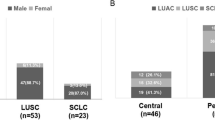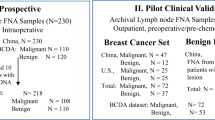Abstract
Previously, we reported that the accuracy of cytological diagnosis of breast lesions could be augmented through the quantitative assessment of DNA methylation of fine-needle aspirate (FNA) washings. Herein, we aimed at the evaluation of the prognostic value of quantitative promoter methylation at three gene loci (APC, CCND2, and RASSF1A) in a large series of FNA washings from breast lesions. Methylation levels of three gene promoters were assessed by quantitative methylation-specific PCR in bisulfite-modified DNA from 211 FNA washings, comprising 178 carcinomas and 33 benign lesions, both histopathologically confirmed. Receiver operator characteristic (ROC) curve analysis was used to determine the diagnostic performance of the gene panel in distinguishing cancer from non-cancerous lesions. Relevant clinicopathologic data and time to progression and/or death from breast cancer were correlated with methylation findings. Log-rank test and Cox-regression model identified independent predictors of prognosis. APC, CCND2, and RASSF1A methylation levels differed significantly between malignant and benign lesions. ROC curve analysis confirmed the diagnostic performance of the gene panel. In univariate analysis, stage was significantly associated with overall, disease-specific and disease-free survival, whereas tumor grade was associated with disease-specific and disease-free survival. Remarkably, RASSF1A methylation was significantly and independently associated with worse disease-free survival in the final multivariate analysis. We confirmed that quantitative gene promoter methylation augments the diagnostic performance of cytopathology. Importantly, and in addition to standard clinicopathologic parameters, RASSF1A high-methylation levels are independent predictors of worse outcome in breast cancer. Thus, epigenetic biomarkers provide valuable tools for breast cancer patient management.





Similar content being viewed by others
References
Ferlay J, Parkin DM, Steliarova-Foucher E (2010) Estimates of cancer incidence and mortality in Europe in 2008. Eur J Cancer 46(4):765–781
Jemal A, Siegel R, Ward E, Hao Y, Xu J, Thun MJ (2009) Cancer statistics, 2009. CA Cancer J Clin 59(4):225–249
Jeronimo C, Costa I, Martins MC, Monteiro P, Lisboa S, Palmeira C et al (2003) Detection of gene promoter hypermethylation in fine needle washings from breast lesions. Clin Cancer Res 9(9):3413–3417
Nemec CF, Listinsky J, Rim A (2007) How should we screen for breast cancer? Mammography, ultrasonography, MRI. Clevel Clin J Med 74(12):897–904
Hamill J, Campbell ID, Mayall F, Bartlett AS, Darlington A (2002) Improved breast cytology results with near patient FNA diagnosis. Acta Cytol 46(1):19–24
Esteller M (2008) Epigenetics in cancer. N Engl J Med 358(11):1148–1159
Esteller M (2007) Cancer epigenomics: DNA methylomes and histone-modification maps. Nat Rev Genet 8(4):286–298
Hinshelwood RA, Clark SJ (2008) Breast cancer epigenetics: normal human mammary epithelial cells as a model system. J Mol Med 86(12):1315–1328
Liu JW, Nagpal JK, Jeronimo C, Lee JE, Henrique R, Kim MS et al (2008) Hypermethylation of MCAM gene is associated with advanced tumor stage in prostate cancer. Prostate 68(4):418–426
Lo PK, Sukumar S (2008) Epigenomics and breast cancer. Pharmacogenomics 9(12):1879–1902
Page DL, Sakamoto G (1987) Infiltrating carcinoma: major histological types. Churchill-Livingstone, Edinburgh
Elston CW, Ellis IO (1998) Assessment of histological grade. Churchill Livingstone, Edinburgh
Greene FLPD, Fleming ID et al (2002) AJCC cancer staging manual, 6th edn. Springer, New York
Clark SJ, Harrison J, Paul CL, Frommer M (1994) High sensitivity mapping of methylated cytosines. Nucleic Acids Res 22(15):2990–2997
Eads CA, Danenberg KD, Kawakami K, Saltz LB, Blake C, Shibata D et al (2000) MethyLight: a high-throughput assay to measure DNA methylation. Nucleic Acids Res 28(8):E32
Lehmann U, Langer F, Feist H, Glockner S, Hasemeier B, Kreipe H (2002) Quantitative assessment of promoter hypermethylation during breast cancer development. Am J Pathol 160(2):605–612
Jeronimo C, Henrique R, Hoque MO, Ribeiro FR, Oliveira J, Fonseca D et al (2004) Quantitative RARbeta2 hypermethylation: a promising prostate cancer marker. Clin Cancer Res 10(12 Pt 1):4010–4014
Henrique R, Ribeiro FR, Fonseca D, Hoque MO, Carvalho AL, Costa VL et al (2007) High promoter methylation levels of APC predict poor prognosis in sextant biopsies from prostate cancer patients. Clin Cancer Res 13(20):6122–6129
Pu RT, Laitala LE, Alli PM, Fackler MJ, Sukumar S, Clark DP (2003) Methylation profiling of benign and malignant breast lesions and its application to cytopathology. Mod Pathol 16(11):1095–1101
Dulaimi E, Hillinck J, Ibanez de Caceres I, Al-Saleem T, Cairns P (2004) Tumor suppressor gene promoter hypermethylation in serum of breast cancer patients. Clin Cancer Res 10(18 Pt 1):6189–6193
Bardou VJ, Arpino G, Elledge RM, Osborne CK, Clark GM (2003) Progesterone receptor status significantly improves outcome prediction over estrogen receptor status alone for adjuvant endocrine therapy in two large breast cancer databases. J Clin Oncol 21(10):1973–1979
Euhus DM, Bu D, Milchgrub S, Xie XJ, Bian A, Leitch AM et al (2008) DNA methylation in benign breast epithelium in relation to age and breast cancer risk. Cancer Epidemiol Biomarkers Prev 17(5):1051–1059
Van der Auwera I, Bovie C, Svensson C, Trinh XB, Limame R, van Dam P et al (2010) Quantitative methylation profiling in tumor and matched morphologically normal tissues from breast cancer patients. BMC Cancer 10:97
Jin Z, Tamura G, Tsuchiya T, Sakata K, Kashiwaba M, Osakabe M et al (2001) Adenomatous polyposis coli (APC) gene promoter hypermethylation in primary breast cancers. Br J Cancer 85(1):69–73
Muller HM, Widschwendter A, Fiegl H, Ivarsson L, Goebel G, Perkmann E et al (2003) DNA methylation in serum of breast cancer patients: an independent prognostic marker. Cancer Res 63(22):7641–7645
Hoque MO, Feng Q, Toure P, Dem A, Critchlow CW, Hawes SE et al (2006) Detection of aberrant methylation of four genes in plasma DNA for the detection of breast cancer. J Clin Oncol 24(26):4262–4269
Acknowledgments
V.L.C is supported by a grant from Fundação para a Ciência e a Tecnologia (SFRH/BD/23374/2005). This study was funded by grants from Liga Portuguesa contra o Cancro—Núcleo Regional do Norte and the Comissão de Fomento da Investigação em Cuidados de Saúde—Ministério da Saúde (Project no. 21/2007).
Author information
Authors and Affiliations
Corresponding author
Rights and permissions
About this article
Cite this article
Martins, A.T., Monteiro, P., Ramalho-Carvalho, J. et al. High RASSF1A promoter methylation levels are predictive of poor prognosis in fine-needle aspirate washings of breast cancer lesions. Breast Cancer Res Treat 129, 1–9 (2011). https://doi.org/10.1007/s10549-010-1160-0
Received:
Accepted:
Published:
Issue Date:
DOI: https://doi.org/10.1007/s10549-010-1160-0




